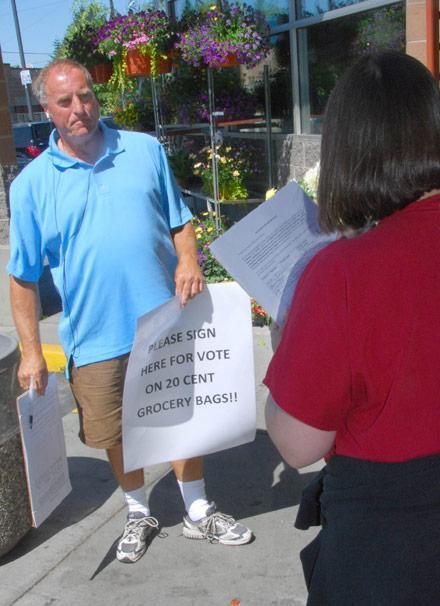Independent markets seek repeal of city's bag fee
PETITION DRIVE. Leonard Ruthford was asking people outside the Morgan Street Thriftway last week to sign a petition for referendum to repeal the city's new ordinance imposing a fee on the use of paper or plastic shopping bags.
<b>Photo by Patrick Robinson</b>
Mon, 08/18/2008
Although the Seattle City Council has approved a 20-cent fee on all disposable shopping bags, the Washington Food Industry is attempting to give its consumers a choice with a referendum that could put the issue to a public vote.
"We agree with the City Council on the environmental goal, but we think that they should not place new taxes on family grocery bills," said Jan Gee, president of the Washington Food Industry, a group that represents independent markets.
Gee and the Washington Food Industry previously approached the Seattle City Council with alternatives to a fee on shopping bags. They pledged that their stores would provide customers with a financial incentive of at least five cents for each reusable bag they brought to stores. The group also offered to prominently display affordable, reusable shopping bags and recycle bag stations in their stores.
But Gee says that the City Council seemed to give their suggestions little consideration. She was also surprised with how quickly Seattle Mayor Greg Nickels signed the proposal into law, just four days after the Council approved it.
When discussing the issue with customers, Gee says at least half were not even aware of the new fee, and approximately 85 percent were opposed to it.
"The issue was not aired enough," Gee said. "We are going to do whatever we have to make sure that the citizens of Seattle have a voice in this."
The Washington Food Industry has filed a referendum in opposition to the city council's decision, but Gee says it will not be an easy process. Her group has until August 28 to collect 14,374 verifiable petition signatures. The Washington Food Industry has gone so far as to hire signature gatherers so that they might be most successful in the short time available.
"We're having to pull out all the plugs just to meet the 30 day deadline," Gee said. "Given enough time we know we'd have tons of support."
Other grocers who previously opposed the ordinance are less determined to fight the fee and are instead focused on making it work in their stores. The Northwest Grocer Association had previously approached the City Council to suggest a single transaction fee if they used disposable bags instead of charging per bag. But today the association is focused on educating the public and making reusable totes available.
"We're very supportive of environmental efforts," said Holly Chisa, a Seattle lobbyist for the Northwest Grocery Association. "We accept that this is the direction the city wants to go."
The Washington Food Industry has received some negative feedback for their efforts. Gee says that board members have received aggravated phone calls and expressed concern for the signature gatherers.
If the Washington Food Industry's referendum is successful then the shopping bag fee will be subject to public vote and could not be implemented until August 2009.
Gee says she is confident that if the public is given a choice they will vote against the fee.
Rose Egge may be contacted at 932.0300 or rosee@robinsonnews.com


